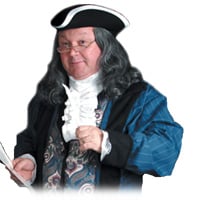Living History
Historical topics constitute a big percentage of school assembly programs. You may find performers able to offer programs on almost any historical character, from Julius Caesar to Teddy Roosevelt. Sometimes a single assembly may deal with several  different characters. Examples would be shows that deal with former First ladies, or famous women in history. Sometimes they deal with the history of a particular region or era or both. In Michigan I often worked with a fellow who did a show specifically for 4th graders about Michigan history and in particular about the lumber industry. The 4th grade teachers requested it every year because it so well supported their curriculum goals. (In almost every state it seems the 4th grade studies their own state history). In Ohio they like Thomas Edison because his story fits their core values so well. Programs dealing with specific cultures such as African American, or Native American history are very popular. But, generally speaking, the most popular characters to impersonate tend to be Abraham Lincoln, George Washington, Ben Franklin, Martin Luther King and Harriett Tubman (this may vary in your part of the country) and all are popular with schools.
different characters. Examples would be shows that deal with former First ladies, or famous women in history. Sometimes they deal with the history of a particular region or era or both. In Michigan I often worked with a fellow who did a show specifically for 4th graders about Michigan history and in particular about the lumber industry. The 4th grade teachers requested it every year because it so well supported their curriculum goals. (In almost every state it seems the 4th grade studies their own state history). In Ohio they like Thomas Edison because his story fits their core values so well. Programs dealing with specific cultures such as African American, or Native American history are very popular. But, generally speaking, the most popular characters to impersonate tend to be Abraham Lincoln, George Washington, Ben Franklin, Martin Luther King and Harriett Tubman (this may vary in your part of the country) and all are popular with schools.
Obviously, not all actors are created equally. In historical programs this becomes really important. How the material is presented varies greatly. Some actors simply walk in in character and begin to speak. In this case, the realistic appearance and the knowledge of the presenter in regard to the character he/she is presenting is very important. But it is second in consideration to how well the actor can handle the audience and keep their interest. Some are simply magnificent. Others are not. The talk-only approach is always a gamble and can fail miserably in the hands of a less than wonderful actor. However, when the actor is good, and the storytelling skills are well honed, this approach can be spellbinding! I have seen teachers simply amazed that their students could sit in awestruck, enraptured silence while an actor in costume simply employs the skill of an old-time story teller. You don’t need to employ a lot of whiz-bang props to entertain today’s kids, despite what many people believe!
Some historical presentations do rely on additional props and visual aids to boost the shows success. Others use music. In fact some historical programs are almost all in music! I have even heard of some history shows where the performer used ventriloquism!
Whatever style is used, even an average quality historical program can really help to bring history alive for the kids and pique their imaginations making them want to learn more. Moreover, it is a great way to tie into annual events such as Veterans Day, or Presidents Day. In case you cannot tell, I am a big fan of historical assembly programs!
Geoff Beauchamp is the Regional Manager of Mobile Ed Productions where "Education Through Entertainment" has been the guiding principal since 1979. Mobile Ed Productions produces and markets quality educational school assembly programs in the fields of science, history, writing, astronomy, natural science, mathematics, character issues and a variety of other curriculum based areas. In addition, Mr. Beauchamp is a professional actor with 30 years of experience in film, television and on stage. He created and still performs occasionally in Mobile Ed's THE LIVING LINCOLN






